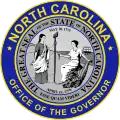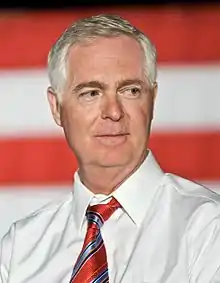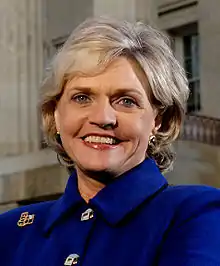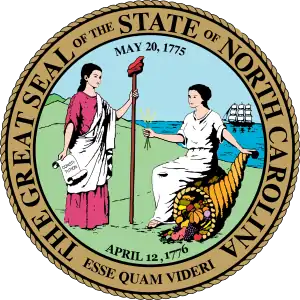Governor of North Carolina
The governor of North Carolina is the head of state and head of government of the U.S. state of North Carolina. The governor directs the executive branch of the government and is the commander in chief of the military forces of the state. The current governor, Democrat Roy Cooper took office on January 1, 2017, and had a public swearing-in ceremony on January 7, 2017. [2]
| Governor of North Carolina | |
|---|---|
 Gubernatorial seal | |
| Style |
|
| Status | |
| Member of | Council of State |
| Residence | Executive Mansion |
| Seat | Raleigh, North Carolina |
| Term length | Four years, renewable once consecutively |
| Inaugural holder | Richard Caswell |
| Formation | November 12, 1776 |
| Deputy | Lieutenant Governor of North Carolina |
| Salary | US$141,265 per year (2013)[1] |
| Website | Official website |
Origin
Originally, under the North Carolina Constitution of 1776, the office was very weak, and was elected by the legislature (North Carolina General Assembly) for a one-year term. Edward B. Dudley became the first North Carolina Governor elected by the people on December 31, 1836. Governors served two-year terms from 1836 until a new constitution was adopted in 1868; since then, all governors are elected for four-year terms.
Well into the twentieth century, the North Carolina Constitution made the state's governor one of the weakest in the nation.[3] Until an amendment was added to the state constitution in 1971, North Carolina governors could only serve a single four-year term and could not run for re-election. After the amendment was passed, in 1980 James B. Hunt became the first governor in state history to be elected to a second term. Governors are still limited to only two consecutive four-year terms, but they may run for further non-consecutive terms. Governor Hunt did just that, winning election to a third and fourth term in 1992 and 1996 after being out of the office for the eight years between 1985 and 1993. The Lieutenant Governor is also limited to two consecutive four-year terms. North Carolina was also the last state in the Union to give its governors veto power over legislation, this was not added to the state constitution until a referendum in 1996.[4]
Much of North Carolina's traditional resistance to strong executive power came from the harsh treatment the state suffered from British governors in the colonial period before the American Revolution. After the state gained its independence from Britain, the state constitution deliberately weakened the executive branch of state government and strengthened the legislative branch. Since the end of Reconstruction in the 1870s the overwhelming majority of the state's governors have been Democrats. The only Republican to be elected governor between 1876 and 1972 was Daniel L. Russell, who served 1897–1901. As Republican strength grew in North Carolina in the 1950s and 1960s the state's gubernatorial elections became increasingly competitive, and in 1972 James Holshouser became the state's first Republican governor of the twentieth century. Even so, Republicans have still had difficulty in winning gubernatorial elections in North Carolina, and the office has usually remained in Democratic hands.
Powers and duties
Among other responsibilities, the Governor of North Carolina heads the Council of State. The governor was the last state chief executive to receive veto power; the office did not have this power until 1996. The office has extensive powers of appointment of executive branch officials, some judges, and members of boards and commissions. Nevertheless, the office has a lower-than-average amount of institutional power compared to governors in other states, according to a 2007 study.[5]
Residence
The Executive Mansion in Raleigh is the official residence of the Governor of North Carolina.[6] The governor's office is in the State Capitol on East Edenton Street.
Post-governorship
As of January 2021, there are five living former N.C. governors. The most recent former governor to die was James Holshouser (1934–2013), on June 17, 2013. The living former governors, in order of service, are:
References
- "CSG Releases 2013 Governor Salaries". The Council of State Governments. June 25, 2013. Retrieved November 23, 2014.
- "Gov.-elect Cooper to be sworn in just after midnight Jan. 1". Winston-Salem Journal. Associated Press. Retrieved December 30, 2016.
- Charlotte Observer column by Jack Betts, September 2007 Archived 2007-09-19 at the Wayback Machine
- webmasters, NC General Assembly. "North Carolina General Assembly - Legislative Drafting Division". www.ncga.state.nc.us. Retrieved March 19, 2018.
- "Stateline". pew.org. Retrieved March 19, 2018.
- State Capitol / Visitor Services: North Carolina Office of Archives & History Archived 2007-03-31 at the Wayback Machine
External links
| Wikimedia Commons has media related to Governors of North Carolina. |
- Official
- General information

.jpg.webp)
.jpg.webp)



